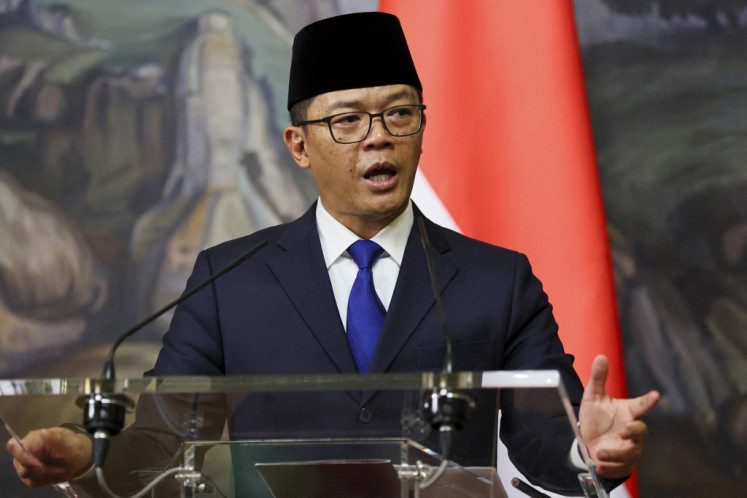Popular Reads
Top Results
Can't find what you're looking for?
View all search resultsPopular Reads
Top Results
Can't find what you're looking for?
View all search resultsView Point: As 'Superman is dead', no use silencing the young
An ode of farewell to an inmateâs wife and baby daughter was scribbled on a prison wall in Denpasar, Bali
Change text size
Gift Premium Articles
to Anyone

An ode of farewell to an inmate's wife and baby daughter was scribbled on a prison wall in Denpasar, Bali. The writer disappeared one day, as did countless others after they were escorted somewhere by wardens. A fellow inmate later put a melody to the words, and 'Tini dan Yanti' (Tini and Yanti) became one of the songs often heard by inmates in the now destroyed Pekambingan prison.
The song is part of a new album titled Prison Songs: Nyanyian yg dibungkam (silenced tunes) launched on Aug. 21 at the Goethe Institute in Jakarta. One crowd-puller was 'Jerinx', or I Gede Ari Astina, the famed drummer of band Superman is Dead. Other musicians involved in the production were from band Navicula, along with members of Bali's Taman 65, a community focused on sharing hidden histories and healing.
'He's so inspiring,' said Susanto, a fan, citing Jerinx' earlier ballad on the controversial reclamation of Bail's Benoa Bay.
Visitors were also drawn to the album itself, the first compilation of songs born almost 50 years ago which were hardly ever recorded. It deftly brings back survivors and their stories to today's generations, though the jail and its background are gone from public memory; it's now a shopping complex in the world's 'paradise resort'.
The songs 'voice suppressed feelings', said Siti, another fan, adding they hoped 'to learn about '65', the 1960s upheaval known as the Sept. 30 Movement (G30S) of the Indonesian Communist Party (PKI), the '65 Tragedy or the '65 Genocide ' terms reflecting different understandings of the events. All sides claim to be victims; it came down to 'kill or be killed', we're told.
The versions are still hotly debated ahead of the 50th anniversary of the so-called Sept. 30 movement of the PKI, the banned communist party blamed for the upheaval. Last week's performances followed a conference and a public hearing involving survivors, held by the Coalition for Justice and Revelation of Truth (KKPK).
The young, exposed to new novels and films on the 1960s upheaval, are intrigued by revelations never heard of at school: bloodshed in several areas, thousands missing, families scattered. That's the good news. The bad news: many may remain apathetic with elders frowning on new queries and discoveries. Some reactions to challenges of 'history' have been intimidating.
But since former president and strongman Soeharto, or 'Superman', is dead ' as Jerinx' band name states ' discouraging other narratives today is, of course, fruitless.
Prison Songs, for instance, combines a CD and a booklet of articles with sketches of prison life.
Documentaries on how the songs came about, featuring former Bali prisoners, which were screened at the album launch, are on YouTube. Despite intimidation, several groups have publicly screened Joshua Oppenheimer's documentaries, The Act of Killing and The Look of Silence. Creative teams have involved young people approaching survivors like Taman 65.
We may cringe at those who jump empathically at the version of the 'victims'. But we need many cool-headed exchanges of diverse versions of history. Survivors on all sides must be emboldened to tell their stories.
Thankfully, the children of reformasi are much less burdened by our taboos.
The artist Elisabeth Ida Mulyani, whose photographs and video documentary on former exiles were exhibited in Brussels, Belgium, said she became intrigued by the 1965 events 'because I felt I had been lied to outright', she wrote in an email.
'Until senior high school I was a true Orba [New Order] child,' she said ' a senior member of her school's 'militaristic' marching group or 'platoon', once awarded by Soeharto's daughter, Siti Hardiyanti Rukmana, a former social affairs minister.
When studying in Yogyakarta, Elisabeth became curious about student demonstrations in 1998. Later, as a student in Belgium she was introduced to some former exiles in Europe. Several would not open up, while others were 'very warm and supportive' of her efforts to reveal their stories, added Elisabeth.
Many say it is likely that new, inaccurate versions will confuse the young, that they will not understand the PKI's role in instigating the violence ' pushing the Land Reform Act, grabbing people's land, denouncing intellectuals through their cultural wing Lekra, terrorizing and killing the innocent.
Such recollections help fuel heated reactions of efforts to seek other 'truths' of 1965. Recently banners appeared in a few cities blaring 'Beware of latent danger of PKI', a phrase straight out of the past.
The banners were among reactions to unfounded reports that President Joko 'Jokowi' Widodo would apologize to the PKI. In his Independence Day speech he said the state was seeking a settlement to past human rights abuses.
'Many of us are still very traumatized' by references to the past conflict, said Mulyono, a 72-year-old member of the Surakarta chapter of the Paguyuban Korban Kekerasan (Association of Victims of Violence). At the sight of the banners featuring the PKI logo, a hammer and sickle, a friend trembled, he said.
As a teacher in October 1965, Mulyono said he was seized and detained for two years; a fellow teacher, his later wife, was detained for three years.
Though they were jailed for only a few years, the stigma sticks, said Mulyono, who attended the public hearing. He and his wife hid their past from their children including one 'successful businessman'. If his son's associates knew of his parents' background, 'he might have troubles', Mulyono said.
Therefore, without our creative and curious youth, crucial testimonies may fade away. Not because the young are being lied to ' but because elders choose to spare them from the lingering stigma and potential harm.
__________________________________
The author is a staff writer at The Jakarta Post









